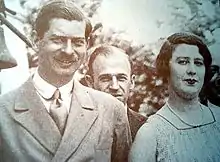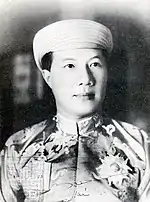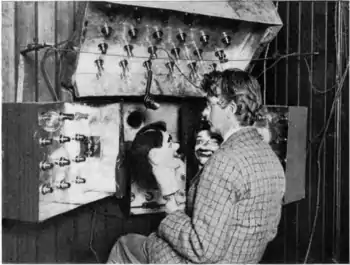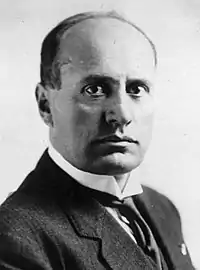January 1926
The following events occurred in January 1926:
| << | January 1926 | >> | ||||
|---|---|---|---|---|---|---|
| Su | Mo | Tu | We | Th | Fr | Sa |
| 1 | 2 | |||||
| 3 | 4 | 5 | 6 | 7 | 8 | 9 |
| 10 | 11 | 12 | 13 | 14 | 15 | 16 |
| 17 | 18 | 19 | 20 | 21 | 22 | 23 |
| 24 | 25 | 26 | 27 | 28 | 29 | 30 |
| 31 | ||||||
Friday, January 1, 1926
- Flooding of the Rhine river struck Cologne; 50,000 were forced to evacuate their homes.[1]
- Ireland's first regular radio service, 2RN (later Radio Éireann), began broadcasting.
- In "the game that changed the South", the Alabama Crimson Tide won the 1926 Rose Bowl with a 20–19 win over the Washington Huskies.[2]
Saturday, January 2, 1926
- Flooding continued to ravage Europe, from England to Romania, due to heavy rains and unseasonably high temperatures.[3]
- Born:
- Harold Bradley, country music guitarist; in Nashville, Tennessee (d. 2019)
- Howard Caine, actor; in North Hollywood, Los Angeles (d. 1993)
- Bruce Harlan, American Olympic diver and University of Michigan diving coach; in Marple Newtown, Pennsylvania (d. 1959)[4]
Sunday, January 3, 1926
- Theodoros Pangalos declared himself dictator in Greece.
- Born: George Martin, producer of The Beatles, in London (d. 2016)
Monday, January 4, 1926

Prince Carol and Miss Lupescu
- The Parliament of Romania ratified the acceptance of Crown Prince Carol's renunciation of his right to the throne in the wake of his scandalous affair with Magda Lupescu, the Roman Catholic daughter of a Jewish pharmacist. His four-year-old son Michael became the new Crown Prince. Carol later reneged on the renunciation and reigned as King of Romania from 1930 to 1940.
- Died: Margherita of Savoy, 74, queen consort of Italy
Tuesday, January 5, 1926
- In the United Kingdom, the first Widow's Pensions were paid out at post offices.[5]
- Born: W.D. Snodgrass, poet, in Beaver Falls, Pennsylvania (d. 2009)
Wednesday, January 6, 1926
- The airline Deutsche Luft Hansa was founded in Berlin.
- Born: Mickey Hargitay, bodybuilder and actor, in Budapest (d. 2006)
Thursday, January 7, 1926
- Ongoing downpours in Europe submerged Great War cemeteries in France and flooded the London subway system.[6]
- The 15th Canadian Parliament was seated. William Lyon Mackenzie King continued as Prime Minister despite the Conservatives winning more seats in the last federal election, by forming a coalition with the Progressives. King did not even have his own seat as he'd lost his York North, Ontario, riding.[7]
- The Royal Academy of Italy was created.
Friday, January 8, 1926

King Ibn Saud

Emperor Bao Dai
- Abdul-Aziz ibn Saud was crowned King of Hejaz in a ceremony at the Grand Mosque of Mecca.
- Bảo Đại became Emperor of Vietnam.
- Born: Chester Feldman, American game show producer, in The Bronx, New York (d. 1997); Evelyn Lear, operatic soprano, in Brooklyn, New York (d. 2012); Hanae Mori, fashion designer, in Yoshika, Shimane, Japan (d. 2022); and Soupy Sales, comedian, in Franklinton, North Carolina (d. 2009)
Saturday, January 9, 1926
- The Navy League of the United States released a report finding the United States Navy to be unprepared for war and well short of the tonnage limitation set by the Washington Naval Treaty.[8]
- A band of twenty Mexican rebels opened fire aboard the Guadalajara-Mexico City train, then looted and burned the train. An estimated twenty to fifty people were killed and about 300,000 pesos (about $150,000 US) worth of cash and bar silver were stolen.[9][10]
Sunday, January 10, 1926
Monday, January 11, 1926
- The Whittemore Gang robbed Belgian diamond merchants Albert Goudris and Emanuel Veerman on West 48th Street in Manhattan, making off with $175,000 in gems.
- Born: Lev Dyomin, astronaut, in Moscow (d. 1998)
Tuesday, January 12, 1926

Correll and Gosden
- Freeman Gosden and Charles Correll premiered their radio program Sam 'n' Henry, in which the two white performers portray two black characters from Harlem looking to strike it rich in the big city. It was a precursor to Gosden and Correll's more popular later program, Amos 'n' Andy.
- The Pasteur Institute in Paris announced the discovery of an anti-tetanus serum.[5]
- As known well synthetic fiber brand, Toray was founded in Japan, as predecessor name was Toyo Rayon.
- Born: Ray Price, U.S. country music singer, in Perryville, Texas (d. 2013)
Wednesday, January 13, 1926
- A mine explosion in Wilburton, Oklahoma, killed 91.[12]
- Britain and Iraq signed a new treaty extending their relations for 25 years or until Iraq joined the League of Nations.[13]
Thursday, January 14, 1926
- German Foreign Minister Gustav Stresemann warned that the Locarno Pact was at risk of breaking down, as Germany accused the Allied powers of infringing on the limits on troops they were allowed to station in the Rhineland.[14]
- A total solar eclipse occurred.
- Born: Tom Tryon, actor and writer, in Hartford, Connecticut (d. 1991)
Friday, January 15, 1926
- Turkey adopted the Swiss Civil Code as part of the ongoing reforms instituted by President Mustafa Kemal Atatürk.[5]
- The film The Sea Beast, starring John Barrymore, was released.
- Born: Maria Schell, actress, in Vienna (d. 2005)
- Died: Louis Majorelle, 66, French furniture designer
Saturday, January 16, 1926
- A BBC comic radio play broadcast by Ronald Knox about a workers' revolution caused a panic in London.[15]
Sunday, January 17, 1926
.jpg.webp)
Ayn Rand
- Twenty-year-old Ayn Rand left Russia, departing from Leningrad by train. Her early life experiences in Communist Russia were a major influence on her philosophy.[16]
- Born: Moira Shearer, ballet dancer and actress, in Dunfermline, Scotland (d. 2006)
Monday, January 18, 1926
- The Italianization of South Tyrol escalated as the government issued a decree requiring citizens of South Tyrol to Italianize any names and titles of nobility "which have been translated into other languages or deformed by foreign orthography or foreign endings." Failure to comply carried a fine of up to 1,000 lira.[17]
Tuesday, January 19, 1926
- Lev Karakhan, the Soviet ambassador to China, sent a protest to the Chinese Foreign Ministry warning of "serious consequences" if a dispute over the two countries' joint management of the Chinese Eastern Railway was not resolved. Manchurian warlord Zhang Zuolin had been seizing parts of the railway line and arresting Soviet officials in retaliation for a decision that made Chinese troops pay half-fare instead of being allowed to ride for free.[18] The dispute was a precursor to the Sino Soviet Conflict of 1929.
- Born: Fritz Weaver, actor, in Pittsburgh, Pennsylvania (d. 2016)
Wednesday, January 20, 1926
- German Chancellor Dr. Hans Luther formed his second cabinet, a minority coalition involving the Centre Party, German People's Party and National People's Party.[19]
- Born: Patricia Neal, actress, in Packard, Kentucky (d. 2010); and David Tudor, American pianist and composer, in Philadelphia (d. 1996)
Thursday, January 21, 1926
- The Chinese Eastern Railway dispute worsened as the general manager of the railway, A.N. Isonov, was arrested by Zhang Zuolin's troops.[18]
- The Belgian Parliament accepted the Locarno Treaties.
- The D.H. Lawrence novel The Plumed Serpent was published.[20]
- Born: Steve Reeves, bodybuilder and actor, in Glasgow, Montana (d. 2000); and Franco Evangelisti, composer, in Rome (d. 1980)
- Died: Camillo Golgi, 82, Austrian physician, pathologist, scientist and Nobel laureate
Friday, January 22, 1926
- Soviet Foreign Minister Georgy Chicherin sent a threatening note to the Manchurian government seeking "permission" for the Soviet army to enter Manchuria if the Chinese Eastern Railway's administration was not restored. Manchuria responded by agreeing to comply, ending the crisis.[18]
Saturday, January 23, 1926
- The Shrine Auditorium opened in Los Angeles.[21]
- Born: Bal Thackeray, Indian politician, in Pune, India (d. 2012)
- Died: Désiré-Joseph Mercier, 74, Belgian cardinal
Sunday, January 24, 1926
- The Third International Radio Week began, featuring transatlantic tests of distance reception. Listeners in New York and Chicago reported successful reception of English and South American radio broadcasts.[22]
Monday, January 25, 1926
- British surgeon Sir Berkeley Moynihan says cancer of the tongue is partly caused by smoking.[5]
- Born: Bob Clarke, illustrator, in Mamaroneck, New York (d. 2013)
Tuesday, January 26, 1926

Baird and his television camera
- Scottish inventor John Logie Baird demonstrated a mechanical television system for members of the Royal Institution and a reporter from The Times at his London laboratory.
- Galician aviator Ramón Franco completed a Trans-Atlantic flight from Huelva, Spain to Buenos Aires, Argentina. There were stopovers at Gran Canaria, Cape Verde, Pernambuco, Rio de Janeiro and Montevideo along the way. The 10,270 km journey was completed in 59 hours and 39 minutes.[23]
Wednesday, January 27, 1926
- The U.S. Senate voted in favor of joining the World Court, but with several specific reservations.[13]
- 30 communists and 12 monarchists were wounded in street fighting in the Charlottenburg district of Berlin during demonstrations on the birthday of the former Kaiser, Wilhelm II. The fighting broke out as communists paraded an effigy of the ex-Kaiser hanged from a gallows. Riot police opened fire after attempts to separate the combatants were met with attacks from both sides.[24]
- Born: Fritz Spiegl, musician, journalist and broadcaster, in Zurndorf, Austria (d. 2003); and Ingrid Thulin, actress, in Sollefteå, Sweden (d. 2004)
Thursday, January 28, 1926
- King Albert, Marshal Ferdinand Foch, the Archbishop of Canterbury and Cardinal Louis-Ernest Dubois were among the attendees for the funeral of Belgian cardinal and national hero Désiré-Joseph Mercier, who died on January 23. Thousands lined the streets of Brussels to watch the funeral procession.[25]
- Died: Katō Takaaki, 66, 24th Prime Minister of Japan; and Ernest Troubridge, 63, Royal Navy officer
Friday, January 29, 1926
- Eugene O'Neill's play The Great God Brown opened at the Greenwich Theatre.
- Born: Abdus Salam, Pakistani theoretical physicist and Nobel Prize laureate, in Jhang (d. 1996)
Saturday, January 30, 1926
- 27 miners were killed in a gas explosion in Mossboro, Alabama; 26 escaped unhurt.[26]
- The Allied occupation of the first zone of the Rhineland ended. At 15:00 hours the British, French and Belgians in the zone all hauled down their flags and withdrew their remaining troops in advance of much of the Rhineland's sovereignty being formally returned to Germany at the stroke of midnight.[27]
- Died: Barbara La Marr, 29, American actress (complications from tuberculosis)
Sunday, January 31, 1926

Mussolini
- Italian Prime Minister Benito Mussolini assumed the power to rule by decree.[28]
- Died: Lou Bierbauer, 60, American baseball player
References
- "Floods Dtive 50,000 out of Homes on Rhine". Chicago Daily Tribune. January 2, 1926. p. 5.
- "1925 College Football National Championship". TipTop25. Archived from the original on January 3, 2015. Retrieved January 3, 2015.
- Skene, Don (January 3, 1926). "Europe Takes to Boats as Deluge Swells Rivers". Chicago Daily Tribune. p. 4.
- "Bruce Harlan Biography and Olympic Results". Sports Reference LLC. 2012. Archived from the original on April 17, 2020. Retrieved July 12, 2021.
- Mercer, Derrik (1989). Chronicle of the 20th Century. London: Chronicle Communications Ltd. p. 338. ISBN 978-0-582-03919-3.
- Wales, Henry (January 8, 1926). "Yank Graves Under Floods". Chicago Daily Tribune. pp. 1–2.
- "Federal Election Trivia". Parliament of Canada. Library of Parliament. Retrieved January 3, 2015.
- Henning, Arthur Sears (January 10, 1926). "Fleet Unfit and Getting Worse, Country Told". Chicago Daily Tribune. p. 1.
- Cornyn, John (January 11, 1926). "Mexican Rebel Band Kills U.S. Man and Troops". Chicago Daily Tribune. p. 1.
- "Mexican Troops Kill Bandits and Recover Loot". The Troy Times. Troy, N.Y. January 12, 1926.
- Wynkoop, Christopher (2006). "The Guadalajara-Mexico City Train Massacre". Retrieved January 3, 2015.
- "Coal Mine Disasters in the United States by State: Oklahoma". usmra.com. Archived from the original on January 3, 2015. Retrieved January 3, 2015.
- "Chronology 1926". indiana.edu. 2002. Retrieved January 3, 2015.
- "Germany Balks at League until Rhine Army Cut". Chicago Daily Tribune. January 15, 1926. p. 11.
- "The BBC Radio Panic, 1926". Museum of Hoaxes. Retrieved January 3, 2015.
- Mayhew, Robert (2005). Ayn Rand and Song of Russia: Communism and Anti-Communism in 1940s Hollywood. Lanham, Maryland: Scarecrow Press, Inc. p. 75. ISBN 0-8108-5276-4.
- "Tyrol Citizens Told to Make Names Italian". Chicago Daily Tribune. January 19, 1926. p. 3.
- Elleman, Bruce (2009). Moscow and the Emergence of Communist Power in China 1925–30. New York: Routledge. p. 20. ISBN 978-0-203-88160-6.
- Collier, Martin; Pedley, Philip (2000). Germany 1919–45. Oxford: Heinemann Educational Publishers. p. 35. ISBN 0-435-32721-6.
- Roberts, Warren; Poplawski, Paul (2001). A Bibliography of D.H. Lawrence (Third ed.). Cambridge University Press. p. 118. ISBN 0-521-39182-2.
- "Shrine Auditorium". CinemaTour. Vision Entertainment Services. Retrieved January 3, 2015.
- "Chicago Fans Hear Britain, South America". Chicago Daily Tribune. January 25, 1926. p. 1.
- "Palos de la Frontera". Discover Huelva. Retrieved January 3, 2015.
- Schultz, Sigrid (January 28, 1926). "Fleet Unfit and Getting Worse, Country Told". Chicago Daily Tribune. p. 5.
- Allen Jay (January 29, 1926). "Belgium Gives Mercier Hero's Final Homage". Chicago Daily Tribune. p. 18.
- "53 Trapped in Alabama Coal Pit; Rescue 26". Chicago Daily Tribune. January 30, 1926. p. 1.
- "Cologne Cheers as British Haul Down Union Jack". Chicago Daily Tribune. January 31, 1926. p. 3.
- Falasca-Zamponi, Simonetta (1997). Fascist Spectacle: The Aesthetics of Power in Mussolini's Italy. Berkeley: University of California Press. p. 61. ISBN 0-520-22677-1.
This article is issued from Wikipedia. The text is licensed under Creative Commons - Attribution - Sharealike. Additional terms may apply for the media files.